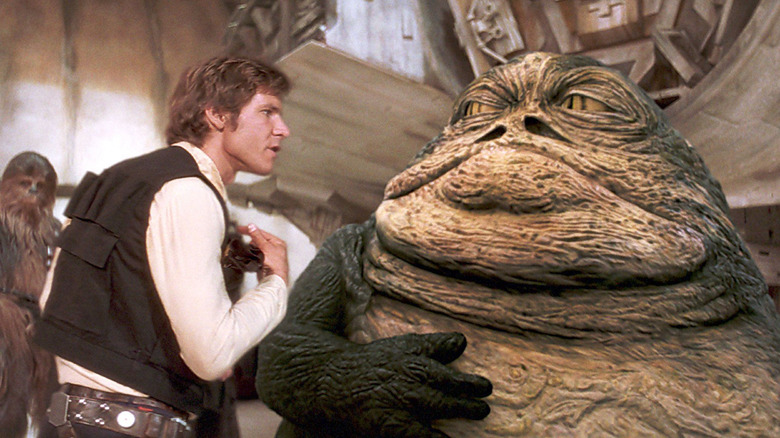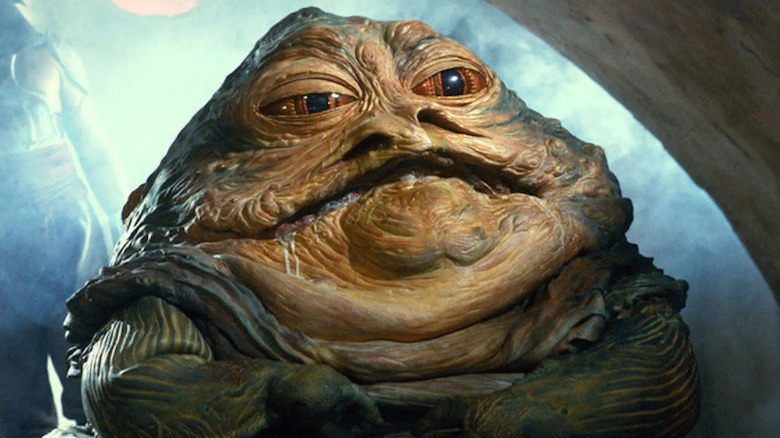Why A Pivotal Harrison Ford Star Wars Scene Sat Unfinished For 20 Years
Once upon a time, the Special Editions of the original "Star Wars" movie trilogy were a big deal, as opposed to something people fight about online when it comes to their preferred version of the films. (Yes, this is where the "Who shot first, Han or Greedo?" debate began. "Maclunkey-gate" came later.) Released in 1997 to mark the 20-year anniversary of "Star Wars: A New Hope," they gave people of a certain age (like me) a chance to finally see George Lucas' space epic on the big screen. Their refurbished visual effects and newly-added footage were but the icing on the cake, as was the restoration of a never-before-seen deleted scene for "A New Hope."
The scene in question has Han Solo (Harrison Ford) being confronted by Jabba the Hutt and his enforcers in the Mos Eisley docking bay where the Millennium Falcon is waiting, shortly after Han has his lethal encounter with Greedo. Declan Mulholland, an Irish actor who guest-starred on "Doctor Who" multiple times in the 1970s, served as Jabba's stand-in on the set of "A New Hope," with Lucas planning to replace him with a stop-motion Jabba figure in post-production. Instead, Lucas would ultimately swap Mulholland out with a CGI Jabba for the movie's Special Edition. The scene later gained a new-and-improved digital Jabba for the film's DVD release in 2004 (bringing him in-line with the crime lord's look in the "Star Wars" prequel trilogy).
"I didn't have the time or the money to complete it," Lucas told ET, explaining why the scene sat unfinished for 20 years. It simply wasn't a priority for him at the time of shooting on "A New Hope," given he had no idea if the movie's sequels would ever come to pass:
"I figured I didn't know whether I'm ever gonna finish the other movies, so whether Jabba the Hutt's in there for the introduction to that character [wasn't] important. But then after the other movies were finished, I said, 'Gee, wouldn't it be great to put that Jabba the Hutt scene back in the way it should be? And introduce Jabba the Hutt where it's supposed to be introduced? So, when he comes in later you understand what everybody's talking about?'"
But did A New Hope need the scene?
Most of the changes in the Special Edition of "Star Wars: A New Hope" are, to be frank, superficial. The upgraded VFX are shiny and all, but they don't really benefit the film's story or world-building. At the worst, they give rise to unnecessary visual clutter, like the various added shots of Mos Eisley.
When it comes to the Jabba scene, there are arguments to be made both in favor of and against its necessity. On the one hand, it gives Jabba a proper introduction prior to his role as an antagonist in "Star Wars: Return of the Jedi" and clears up any confusion audiences might have about Han's dealings with him. On the other hand, it doesn't really contain any information that wasn't already stated or couldn't be intuited from Han's shoot-out with Greedo. Moreover, Jabba's absence from the original version of "A New Hope" gave that film and its followup, "Star Wars: The Empire Strikes Back," time to build-up his arrival by having characters talk about him only. Jabba's first appearance in "Return of the Jedi" becomes a lot less menacing when you've already seen him in the flesh two movies earlier (or more if we're including the prequel trilogy).
This also speaks to a greater issue with the "Star Wars" franchise since Lucas sold the property to Disney in 2012. Subsequent movies like "Solo: A Star Wars Story" and "The Mandalorian" spinoff "The Book of Boba Fett" have been criticized for needlessly showing events other "Star Wars" projects only alluded to or briefly touched upon, trusting viewers to fill in the blanks on their own. It's not a one-to-one comparison, but it parallels the problems with the Special Edition of "A New Hope." Lucas may've initially left the Jabba scene out of the film due to a lack of resources, but on some level he recognized it was expendable. He might've done better to trust his original instinct and stick with it so many years later.

